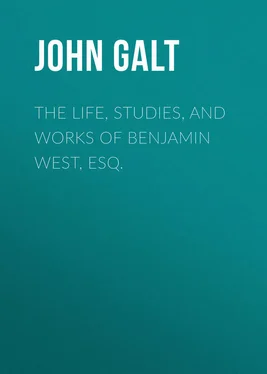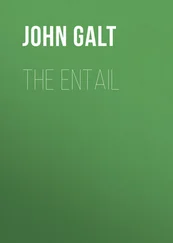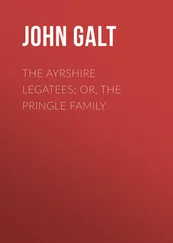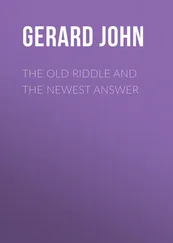John Galt - The Life, Studies, and Works of Benjamin West, Esq.
Здесь есть возможность читать онлайн «John Galt - The Life, Studies, and Works of Benjamin West, Esq.» — ознакомительный отрывок электронной книги совершенно бесплатно, а после прочтения отрывка купить полную версию. В некоторых случаях можно слушать аудио, скачать через торрент в формате fb2 и присутствует краткое содержание. Жанр: foreign_antique, foreign_prose, на английском языке. Описание произведения, (предисловие) а так же отзывы посетителей доступны на портале библиотеки ЛибКат.
- Название:The Life, Studies, and Works of Benjamin West, Esq.
- Автор:
- Жанр:
- Год:неизвестен
- ISBN:нет данных
- Рейтинг книги:5 / 5. Голосов: 1
-
Избранное:Добавить в избранное
- Отзывы:
-
Ваша оценка:
- 100
- 1
- 2
- 3
- 4
- 5
The Life, Studies, and Works of Benjamin West, Esq.: краткое содержание, описание и аннотация
Предлагаем к чтению аннотацию, описание, краткое содержание или предисловие (зависит от того, что написал сам автор книги «The Life, Studies, and Works of Benjamin West, Esq.»). Если вы не нашли необходимую информацию о книге — напишите в комментариях, мы постараемся отыскать её.
The Life, Studies, and Works of Benjamin West, Esq. — читать онлайн ознакомительный отрывок
Ниже представлен текст книги, разбитый по страницам. Система сохранения места последней прочитанной страницы, позволяет с удобством читать онлайн бесплатно книгу «The Life, Studies, and Works of Benjamin West, Esq.», без необходимости каждый раз заново искать на чём Вы остановились. Поставьте закладку, и сможете в любой момент перейти на страницу, на которой закончили чтение.
Интервал:
Закладка:
At length they reached a turn of the river not far from the principal scene of destruction, and the Indian who remembered the death of the two officers, stopped; the detachment also halted. He then looked around in quest of some object which might recall, distinctly, his recollection of the ground, and suddenly darted into the wood. The soldiers rested their arms without speaking. A shrill cry was soon after heard; and the other guides made signs for the troops to follow them towards the spot from which it came. In the course of a short time they reached the Indian warrior, who, by his cry, had announced to his companions that he had found the place where he was posted on the day of battle. As the troops approached, he pointed to the tree under which the officers had fallen. Captain West halted his men round the spot, and with Sir Peter Halket and the other officers, formed a circle, while the Indians removed the leaves which thickly covered the ground. The skeletons were found, as the Indian expected, lying across each other. The officers having looked at them some time, the Major said, that as his father had an artificial tooth, he thought he might be able to ascertain if they were indeed his bones and those of his brother. The Indians were, therefore, ordered to remove the skeleton of the youth, and to bring to view that of the old officer. This was immediately done, and after a short examination, Major Halket exclaimed, "It is my father!" and fell back into the arms of his companions. The pioneers then dug a grave, and the bones being laid in it together, a highland plaid was spread over them, and they were interred with the customary honours.
When Lord Grosvenor bought the picture of the death of Wolfe, Mr. West mentioned to him the finding of the bones of Bradock's army as a pictorial subject capable of being managed with great effect. The gloom of the vast forest, the naked and simple Indians supporting the skeletons, the grief of the son on recognizing the relics of his father, the subdued melancholy of the spectators, and the picturesque garb of the Pennsylvanian sharpshooters, undoubtedly furnished topics capable of every effect which the pencil could bestow, or the imagination require in the treatment of so sublime a scene. His Lordship admitted, that in possessing so affecting an incident as the discovery of the bones of the Halkets, it was superior even to that of the search for the remains of the army of Varus; the transaction, however, being little known, and not recorded by any historian, he thought it would not be interesting to the public. Other engagements have since prevented Mr. West from attempting it on his own account. But it is necessary that the regular narrative should be resumed; for the military history of the Artist terminated when he was recalled home by the last illness of his mother, although the excitement which the events that led to it occasioned never lost its influence on his mind, especially that of the incident which has been described, and which has ever been present to his imagination as one of the most affecting occurrences, whether considered with respect to the feelings of the gentlemen most immediately interested in it, or with respect to the wild and solemn circumstances under which the service was performed.
On his return to Philadelphia, he again resided with Mr. Clarkson, his brother-in-law; and Provost Smith, in the evenings, continued to direct his attention to those topics of literature which were most suitable to cherish the expansion of his mind, and to enrich his imagination with ideas useful to his profession. While his leisure hours were thus profitably employed, his reputation as a portrait painter was rapidly extended. His youth, and the peculiar incidents of his history, attracted many sitters, and his merits verified the recommendations of his friends. This constancy of employment, no doubt materially tended to his improvement in the manipulation of his art; for whatever may be the native force of talent, it is impossible that the possessor can attain excellence by any other means than practice. Facility to express the conceptions of the mind must be acquired before the pen or the pencil can embody them appropriately, and the author who does not execute much, however little he may exhibit, can never expect to do justice to the truth and beauty of his own ideas. West was very soon duly impressed with the justness of this observation; and, while in the execution of his portraits, he was assiduous to acquire a ready knowledge of those characteristic traits which have since enabled him to throw so much variety into his compositions; he felt conscious that, without seeing better pictures than his own, he could neither hope to attain distinction, nor to appreciate his own peculiar powers. It was this consideration that induced him to adopt a most rigid system of frugality. He looked forward to a period when he might be enabled, by the fruits of his own industry, to visit the great scenes of the fine arts in Europe; and the care with which he treasured the money that he received for his portraits was rewarded even at the time with the assurance of realizing his expectations. The prices which he first fixed for his portraits, were two guineas and a half for a head, and five guineas for a half length.
After what has already been mentioned of the state of Society in Pennsylvania, it is needless to say that at the period to which these memoirs refer, there were but few pictures in the British Plantations; indeed, without any other explanation, all that should be contended for by any person who might imagine it necessary to advocate the pretensions of Benjamin West to be placed in the list of original and self-instructed artists, would be readily granted, upon stating the single fact, that he was born in Pennsylvania, and did not leave America till the year 1760. At the same time, it might be construed into an injudicious concealment, if it were not mentioned that Governor Hamilton, who at that period presided with so much popularity over the affairs of the province, possessed a few pictures, consisting, however, chiefly of family portraits. Among them was a St. Ignatius, which was found in the course of the preceding war on board a Spanish prize, and which Mr. Pennington obtained leave for West to copy. The Artist had made choice of it himself, without being aware of its merits as a work of art, for it was not until several years after that he discovered it to be a fine piece of the Morillo school, and in the best style of the master.
This copy was greatly admired by all who saw it, and by none more than his valuable friend Provost Smith, to whom it suggested the notion that portrait-painting might be raised to something greatly above the exhibition of a mere physical likeness; and he in consequence endeavoured to impress upon the mind of his pupil, that characteristic painting opened a new line in the art, only inferior in dignity to that of history, but requiring, perhaps, a nicer discriminative tact of mind. This judicious reflection of Dr. Smith was however anticipated by Sir Joshua Reynolds, who had already made the discovery, and was carrying it into effect with admirable success. The Provost, however, was unacquainted with that circumstance, and induced West to make an experiment by drawing his portrait in the style and attitude of the St. Ignatius.
While he was thus employed on portraits, a gentleman of the name of Cox called on him to agree for a likeness of his daughter; and the picture of Dr. Smith attracted his attention. It indeed appeared to him to evince such a capacity for historical composition, that, instead of then determining any thing respecting his daughter's portrait, he gave an order for an historical picture, allowing the Artist himself to choose the subject. This task had peculiar charms; for the Painter in the course of reading the Bible to his mother some time before, had been led to think that the Trial of Susannah was a fine subject, and he was thus enabled, by the liberality of Mr. Cox, to embody the conceptions of his imagination while they were yet in all the freshness and vigour of original formation. He made his canvas about the size of a half length portrait, on which he introduced not fewer than forty figures. In the execution he followed the rule which he had adopted in painting the Death of Socrates, and drew the principal figures from living models. – It is not known what has become of the Trial of Susannah. In the rebellion of the Colonies, Mr. Cox adhered to the British interest; and his daughter, the last person into whose possession the picture has been traced, having married a British officer, came to England during the war, and the Artist has not heard where she has since resided.
Читать дальшеИнтервал:
Закладка:
Похожие книги на «The Life, Studies, and Works of Benjamin West, Esq.»
Представляем Вашему вниманию похожие книги на «The Life, Studies, and Works of Benjamin West, Esq.» списком для выбора. Мы отобрали схожую по названию и смыслу литературу в надежде предоставить читателям больше вариантов отыскать новые, интересные, ещё непрочитанные произведения.
Обсуждение, отзывы о книге «The Life, Studies, and Works of Benjamin West, Esq.» и просто собственные мнения читателей. Оставьте ваши комментарии, напишите, что Вы думаете о произведении, его смысле или главных героях. Укажите что конкретно понравилось, а что нет, и почему Вы так считаете.



![Brian Thompson - A Monkey Among Crocodiles - The Life, Loves and Lawsuits of Mrs Georgina Weldon – a disastrous Victorian [Text only]](/books/704922/brian-thompson-a-monkey-among-crocodiles-the-life-thumb.webp)








